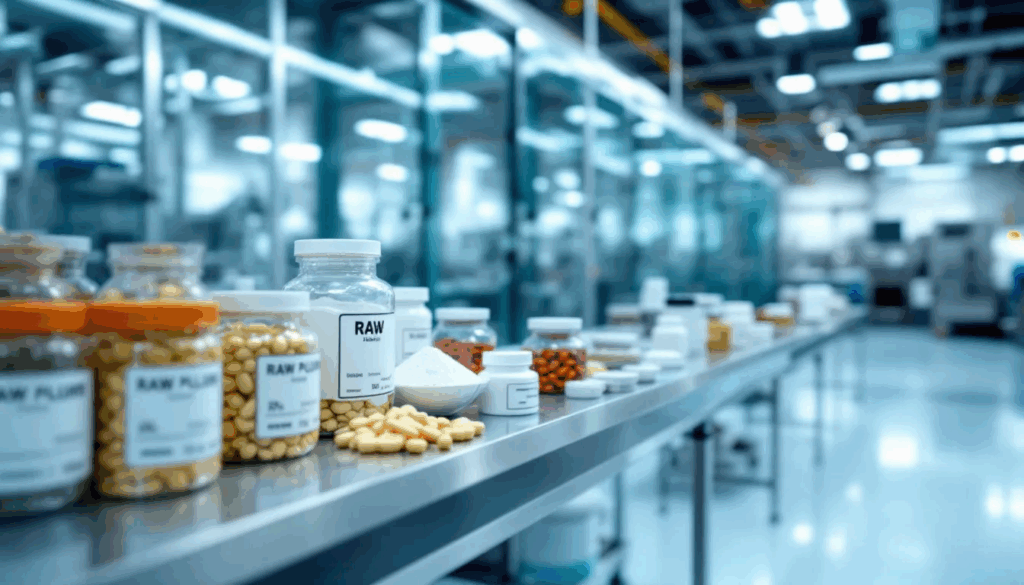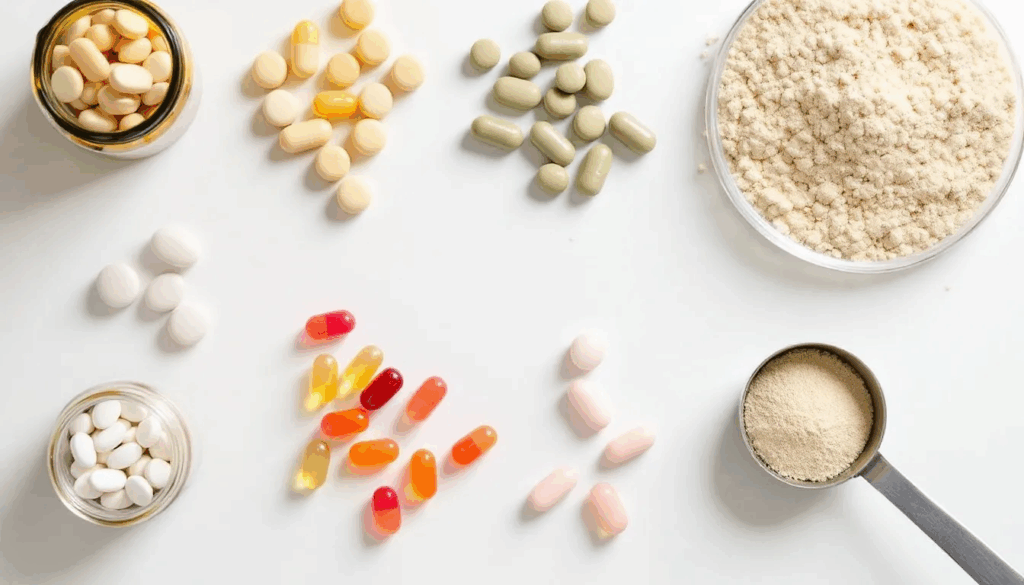The dietary supplement industry reached $179.53 billion in 2024, with contract manufacturing representing a rapidly growing $59.63 billion segment expected to reach $121.2 billion by 2030. For entrepreneurs and established brands looking to enter this lucrative market, choosing the right manufacturing partner is critical to success.
Whether you’re launching your first supplement line or expanding an existing health business, understanding the landscape of dietary supplement manufacturers will help you make informed decisions about production, quality, and costs. This comprehensive guide covers everything you need to know about working with supplement manufacturers, from evaluating capabilities to understanding industry trends.

What Are Dietary Supplement Manufacturers
Dietary supplement manufacturers are specialized companies that produce vitamins, minerals, herbs, and nutritional products for brands and retailers. These manufacturers handle the complex process of transforming raw materials into finished supplement products that meet regulatory standards and consumer expectations.
The industry operates primarily through two main business models: contract manufacturing and private label manufacturing. Contract manufacturers work with clients to develop custom formulations based on specific requirements, while private label manufacturers offer pre-formulated products that brands can customize with their own packaging and branding.
As of 2024, the supplement industry has become increasingly sophisticated, with manufacturers serving a market that encompasses everything from basic multivitamins to complex sports nutrition formulas and personalized health solutions. These companies play a crucial role in ensuring that supplement products meet the growing demand from health-conscious consumers.
Most reputable dietary supplement manufacturers must maintain FDA registration and comply with current Good Manufacturing Practices (cGMP) standards. These regulations ensure that manufacturing facilities meet strict quality control requirements, from raw material testing to final product verification. The FDA requires manufacturers to register their facilities and maintain detailed records of their manufacturing processes.
Key services provided by supplement manufacturers include formulation development, ingredient sourcing, production planning, quality testing, packaging, labeling, and often fulfillment services. Many manufacturers also offer research and development support to help brands create innovative products that serve specific supplement needs in the marketplace.
Types of Dietary Supplement Manufacturing Companies
The supplement manufacturing landscape includes several distinct types of companies, each offering different capabilities and serving different market segments. Understanding these differences is essential when selecting a manufacturing partner for your supplement business.
Contract manufacturers offering custom formulation services represent the premium segment of the industry. These companies work closely with clients to develop unique formulas based on specific ingredient profiles, target demographics, or therapeutic goals. They typically require higher minimum order quantities but provide the most flexibility in product development and can accommodate complex formulation requirements.
Private label manufacturers provide pre-formulated products that brands can quickly bring to market with custom packaging and labeling. This model offers faster turnaround times and lower minimum order quantities, making it ideal for new brands or those testing market demand. The trade-off is limited customization of the actual formula.
Specialty manufacturers focus on specific delivery formats such as softgels, gummies, or powders. These companies have invested heavily in specialized equipment and expertise for particular manufacturing processes. For example, softgel manufacturers require sophisticated encapsulation technology, while gummy manufacturers need specialized molding and flavoring capabilities.
Full-service manufacturers provide turnkey solutions that include everything from formulation development to packaging and fulfillment. These companies can handle the entire supply chain, making them attractive to brands that want to minimize the number of vendors they work with. They often serve as a one-stop shop for supplement contract needs.
White label manufacturers offer the quickest path to market with pre-made products that require minimal customization. While this limits differentiation, it allows new brands to establish market presence quickly and test consumer response before investing in custom manufacturing.
Manufacturing Formats and Capabilities
Modern supplement manufacturers offer a wide range of delivery formats, each with specific advantages for different types of nutrients and consumer preferences. Understanding these options helps brands choose the most appropriate format for their target market and product goals.
Capsule and Tablet Manufacturing
Capsule manufacturing represents one of the most versatile options in supplement production. Manufacturers can produce both gelatin and vegetarian capsule options, with vegetarian capsules made from plant-based materials becoming increasingly popular among health-conscious consumers.
Tablet manufacturing offers options for immediate release and time-release formulations. Time-release tablets use specialized coating technologies to control nutrient absorption rates, making them ideal for vitamins and minerals that are better absorbed gradually throughout the day.
Production capacity for capsules and tablets varies significantly among manufacturers, with facilities capable of producing anywhere from 100,000 to 10 million units per day. Many manufacturers offer custom imprinting services and colored capsule capabilities to help brands create distinctive products that stand out in the market.
The manufacturing process for capsules and tablets requires precise control of content uniformity to ensure each unit contains the exact amount of active ingredients. Quality manufacturers use advanced blending equipment and rigorous testing protocols to verify consistent potency across entire production runs.
Softgel Production
Softgel manufacturing requires specialized equipment designed specifically for oil-based and liquid formulations. This format is particularly popular for nutrients that are naturally oil-soluble, such as omega-3 fatty acids, vitamin D, and CoQ10 supplements.
One significant advantage of softgel encapsulation is extended shelf life compared to other formats. The sealed gelatin shell protects ingredients from oxidation and moisture, which is especially important for delicate nutrients that can degrade when exposed to air or humidity.
Softgel production typically involves higher minimum order quantities, usually ranging from 25,000 to 100,000 units, due to the specialized nature of the manufacturing process. However, the premium positioning and superior bioavailability of many softgel products often justify the higher initial investment.
Manufacturers with softgel capabilities often specialize in formulations that require precise liquid measurements and complex ingredient combinations. The encapsulation process allows for better taste masking of unpleasant ingredients and provides consumers with easy-to-swallow options for larger doses of nutrients.
Powder and Liquid Manufacturing
Powder manufacturing encompasses everything from simple protein blending to complex sports nutrition formulations with multiple active ingredients. Specialized manufacturers in this category have developed sophisticated flavoring systems that can mask the taste of bitter or unpalatable ingredients while creating great-tasting final products.
Liquid supplement production requires different equipment and expertise compared to solid dosage forms. Manufacturers must have capabilities for creating stable liquid formulations that maintain potency and prevent separation or degradation over time. Many liquid manufacturers offer custom flavoring systems that can create unique taste profiles for different brands.
Both powder and liquid formats offer flexibility in packaging options, including stick pack and single-serve packaging that appeals to consumers seeking convenience and portability. Sports nutrition manufacturers often specialize in these formats because they allow for larger serving sizes and faster absorption compared to capsules or tablets.
Quality control for powder and liquid manufacturing involves additional testing for factors like particle size distribution, flowability, and stability under various storage conditions. Manufacturers must verify that powders mix consistently and that liquids maintain their intended characteristics throughout their shelf life.
Gummy Manufacturing
Gummy manufacturing has become one of the fastest-growing segments in supplement production, driven by consumer preference for more enjoyable supplement experiences. Manufacturers can produce both pectin-based and gelatin-based gummy formulations, with pectin options appealing to vegetarian and vegan consumers.
The gummy manufacturing process requires specialized equipment for creating consistent dosing and texture across all units. Manufacturers must carefully control factors like moisture content, pH levels, and cooling temperatures to produce gummies that maintain their shape and deliver consistent nutrient levels.
Custom shapes, colors, and flavor development capabilities vary among gummy manufacturers. Leading companies in this space have invested in sophisticated molding equipment that can create unique shapes and sizes while maintaining accurate dosing. The growing market for both adult and children’s vitamins has driven innovation in this area.
Quality control for gummy manufacturing is particularly critical because the format requires balancing taste, texture, and nutritional content. Manufacturers must verify that each gummy contains the correct amount of active ingredients while maintaining appealing sensory characteristics that encourage consistent use by consumers.

Quality Standards and Certifications
Quality standards in supplement manufacturing are governed by multiple regulatory bodies and certification organizations, each providing different levels of assurance for product safety and efficacy. Understanding these standards is crucial when evaluating potential manufacturing partners.
FDA registration and current Good Manufacturing Practices (cGMP) requirements form the foundation of quality standards in the United States. All dietary supplement manufacturers must register their facilities with the FDA and follow cGMP guidelines that cover everything from facility design to employee training. These regulations ensure that manufacturers maintain consistent quality throughout their operations.
NSF International and USP certification programs provide additional layers of quality assurance beyond basic FDA requirements. NSF certification involves regular facility inspections and product testing to verify that manufacturers meet strict standards for contamination control and label accuracy. USP certification focuses on ingredient identity and purity testing using pharmacopeial standards.
FSSC 22000 food safety certification standards have become increasingly important in supplement manufacturing, particularly for companies serving international markets. This certification demonstrates that manufacturers have implemented comprehensive food safety management systems that address potential hazards throughout the production process.
Third-party testing for potency, purity, and contaminants is now considered essential for reputable supplement manufacturers. Leading companies invest in advanced testing equipment and work with accredited laboratories to verify that their products meet label claims and are free from harmful substances like heavy metals, pesticides, and microbial contaminants.
Specialized certifications, including organic, Non-GMO, and kosher/halal certifications, are increasingly important for serving specific market segments. Manufacturers seeking these certifications must implement additional quality control measures and documentation to verify compliance with specific standards.
ISO 9001 quality management systems certification demonstrates that manufacturers have implemented systematic approaches to quality control that go beyond basic regulatory requirements. This certification involves regular audits and continuous improvement processes that help ensure consistent product quality over time.
Leading Dietary Supplement Manufacturing Companies
The supplement manufacturing industry includes both large multinational corporations and specialized regional manufacturers, each offering different capabilities and serving different market segments. Understanding the competitive landscape helps brands identify potential partners that match their specific requirements.
Top contract manufacturers by production volume include industry leaders like Catalent, Lonza Group, and Glanbia, which operate multiple facilities worldwide and serve major supplement brands. These companies typically offer the most advanced manufacturing capabilities and can handle large-scale production requirements, but often have higher minimum order quantities and longer lead times.
Regional manufacturers in key locations like California, New York, Utah, and Florida often provide more personalized service and greater flexibility for smaller brands. These manufacturers have developed expertise in specific market segments and can often accommodate lower minimum order quantities while maintaining high quality standards.
Specialized manufacturers focusing on sports nutrition, probiotics, and herbal supplements have developed unique capabilities that set them apart from general supplement manufacturers. Probiotic manufacturers, for example, require specialized equipment for handling live cultures and maintaining viability throughout the manufacturing process.
International manufacturers serving global markets have become increasingly important as supplement brands expand internationally. These companies understand regulatory requirements in multiple countries and can help brands navigate complex compliance issues when entering new markets.
Minimum order quantities vary significantly among manufacturers, ranging from 1,000 units for some private label products to 100,000 units or more for complex custom formulations. Brands should carefully evaluate their volume requirements and growth projections when selecting manufacturing partners to ensure they can meet minimum requirements without overcommitting inventory resources.
How to Choose a Dietary Supplement Manufacturer
Selecting the right manufacturing partner requires careful evaluation of multiple factors that will impact both product quality and business success. A systematic approach to this decision can help ensure that you choose a manufacturer that supports your long-term business goals.

Essential Evaluation Criteria
Manufacturing capabilities must match your specific product requirements, including the ability to handle your chosen ingredients and delivery format. Some ingredients require specialized handling or storage conditions, while certain formats like softgels or gummies require specific equipment that not all manufacturers possess.
Minimum order quantities should align with your budget and inventory management capabilities. New brands often benefit from working with manufacturers that offer lower minimums, even if the per-unit cost is higher, because this reduces initial investment risk and allows for market testing before committing to larger orders.
Lead times for production typically range from 4-12 weeks, depending on the complexity of the formulation and current demand. Manufacturers with shorter lead times can help brands respond more quickly to market opportunities, but may charge premium pricing for expedited service. It’s important to factor production time into your inventory planning and marketing launch schedules.
Quality certifications and testing capabilities should meet or exceed your market requirements and target customer expectations. Brands targeting premium market segments often need manufacturers with multiple certifications and comprehensive testing protocols, while mass market products may require less extensive certification.
Regulatory compliance and FDA inspection history provide insight into a manufacturer’s commitment to quality and regulatory standards. Request information about recent FDA inspections, any warning letters or citations, and how the manufacturer addressed any identified issues. A clean regulatory history indicates consistent compliance with manufacturing standards.
Custom formulation and R&D support services can be valuable for brands wanting to develop unique products or improve existing formulations. Some manufacturers offer extensive research capabilities and can help optimize formulations for bioavailability, stability, or cost-effectiveness.
Cost Considerations
Setup fees for new products typically range from $500 to $5,000, depending on the complexity of the formulation and any required tooling or mold development. Gummy products often have higher setup costs due to custom mold requirements, while standard capsule or tablet products usually have lower initial costs.
Per-unit pricing varies significantly based on formulation complexity, production volume, and chosen format. Simple formulations with common ingredients generally cost less to produce than complex formulations with expensive or specialized ingredients. Volume pricing tiers can provide significant cost savings for brands that can commit to larger quantities.
Additional costs for custom packaging and labeling can add substantial expense to the total product cost. Some manufacturers offer in-house packaging capabilities that may be more cost-effective than working with separate packaging vendors, while others focus solely on manufacturing and expect clients to handle packaging separately.
Shipping and fulfillment service options vary among manufacturers, with some offering comprehensive logistics support while others simply ship finished products to client-specified locations. Integrated fulfillment services can simplify operations for smaller brands but may be more expensive than managing logistics independently.
Supplement Manufacturing Process
The supplement manufacturing process involves multiple phases, each requiring careful coordination between the manufacturer and client to ensure successful outcomes. Understanding this process helps brands plan effectively and set realistic expectations for product development timelines.
The initial consultation and needs assessment phase typically involves detailed discussions about target market, desired ingredients, budget constraints, and timeline requirements. Experienced manufacturers use this information to recommend appropriate formulation approaches and manufacturing options that align with client goals.
Formula development and ingredient sourcing usually take 2-4 weeks for standard formulations, but can extend longer for complex or innovative products. During this phase, manufacturers work with clients to finalize ingredient specifications, determine appropriate dosages, and source raw materials from qualified suppliers. Quality manufacturers maintain relationships with multiple ingredient suppliers to ensure consistent availability and competitive pricing.
Pilot batch production and testing allow clients to evaluate product quality before committing to full-scale production. This phase typically produces small quantities for sensory evaluation, stability testing, and label verification. Any necessary adjustments to the formulation or manufacturing process are made during this stage.
Full-scale manufacturing and quality control involve producing the agreed-upon quantities while maintaining strict quality standards throughout the process. Manufacturers typically conduct multiple quality checks during production, including raw material testing, in-process monitoring, and finished product verification to ensure content uniformity and potency.
Packaging, labeling, and fulfillment services complete the manufacturing process by preparing products for distribution. Many manufacturers offer integrated packaging capabilities that can reduce complexity and potentially lower costs compared to using separate packaging vendors. The manufacturing team works to ensure that all labeling meets regulatory requirements and accurately reflects product contents.
The complete timeline from concept to finished product typically ranges from 6-16 weeks, depending on formulation complexity, testing requirements, and current production schedules. Brands should factor this timeline into their marketing and launch planning to ensure products are available when needed.
Industry Trends and Market Outlook
The dietary supplement manufacturing industry continues to evolve rapidly, driven by changing consumer preferences, technological advances, and new scientific research. Understanding these trends helps brands and manufacturers position themselves for future success.
Growth in personalized nutrition and custom formulations represents one of the most significant trends in supplement manufacturing. Consumers increasingly seek products tailored to their specific health needs, genetic profiles, or lifestyle factors. This trend is driving demand for manufacturers with advanced formulation capabilities and flexible production systems that can accommodate smaller, more targeted production runs.
Increasing demand for plant-based and organic supplements reflects broader consumer trends toward natural and sustainable products. Manufacturers are investing in organic certification and developing expertise in plant-based ingredients, including adaptogens, herbal extracts, and alternative protein sources. This trend is particularly strong among younger consumers who prioritize environmental sustainability and clean labeling.
Expansion of gummy vitamins and functional foods continues to transform the supplement landscape. Gummy formats have moved beyond children’s products to encompass adult vitamins, sports nutrition, and specialized therapeutic applications. Manufacturers are developing new gummy technologies that can accommodate higher doses and more diverse ingredient profiles.

Technology integration in manufacturing and quality testing is improving both efficiency and product quality. Advanced analytics help manufacturers optimize formulations and predict stability, while automated quality control systems can detect issues more quickly and accurately than traditional methods. Some manufacturers are exploring AI-driven formulation development and predictive quality control systems.
Sustainability initiatives and eco-friendly packaging are becoming competitive differentiators in the supplement industry. Manufacturers are implementing programs to reduce waste, conserve energy, and source ingredients responsibly. Packaging innovations focus on reducing plastic use and developing biodegradable or recyclable alternatives that maintain product protection.
The industry is projected to maintain strong growth with an estimated 7.8% annual growth rate through 2028. This growth is driven by increasing health consciousness, aging populations in developed countries, and expanding access to supplements in emerging markets. Contract manufacturing is expected to grow even faster as more brands choose to outsource production rather than invest in their own manufacturing facilities.
Regulatory changes and increased oversight are likely to continue shaping the industry. Manufacturers that invest in compliance capabilities and quality systems will be better positioned to serve brands targeting regulated markets or premium customer segments that demand higher quality standards.
The convergence of supplements with other product categories, including functional foods, beverages, and personal care products, is creating new opportunities for manufacturers with diverse capabilities. Companies that can produce multiple product types may find advantages in serving brands that want to expand beyond traditional supplement formats.
Conclusion
Choosing the right dietary supplement manufacturer is a critical decision that will impact every aspect of your supplement business, from product quality and customer satisfaction to profitability and growth potential. The industry offers numerous options, from large-scale contract manufacturers capable of handling massive production volumes to specialized companies focused on specific formats or market segments.
Success in supplement manufacturing partnerships depends on thoroughly evaluating potential manufacturers against your specific requirements, including production capabilities, quality standards, minimum order quantities, and cost structures. Take time to verify certifications, review facility inspections, and speak with existing clients to understand each manufacturer’s strengths and limitations.
The supplement industry’s continued growth and evolution create opportunities for brands that partner with manufacturers capable of adapting to changing market demands. Whether you’re launching your first supplement line or expanding an existing health business, investing time in selecting the right manufacturing partner will provide a foundation for long-term success in this dynamic and growing market.

